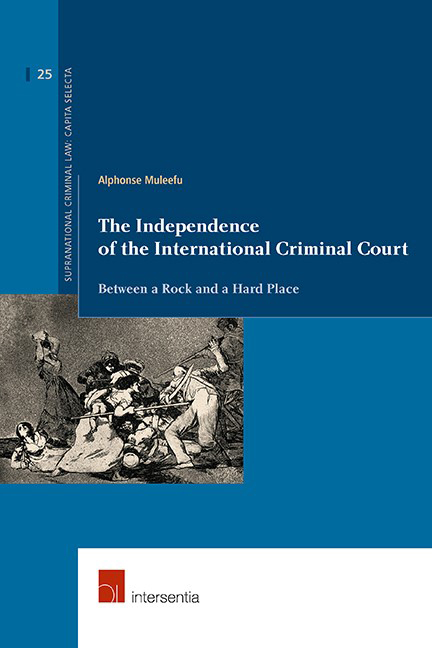Book contents
- Frontmatter
- Book part
- Dedication
- Preface
- Contents
- List of Abbreviations
- Chapter 1 General Introduction and Some Points of Departure
- Chapter 2 Competing Narratives about the ICC
- Chapter 3 The ICC Prosecutor's Decision-Making Process
- Chapter 4 Between Independence and Pragmatism
- Chapter 5 Concluding Remarks
- Bibliography
- Index
- About the Author
Chapter 3 - The ICC Prosecutor's Decision-Making Process
Published online by Cambridge University Press: 15 November 2019
- Frontmatter
- Book part
- Dedication
- Preface
- Contents
- List of Abbreviations
- Chapter 1 General Introduction and Some Points of Departure
- Chapter 2 Competing Narratives about the ICC
- Chapter 3 The ICC Prosecutor's Decision-Making Process
- Chapter 4 Between Independence and Pragmatism
- Chapter 5 Concluding Remarks
- Bibliography
- Index
- About the Author
Summary
From July 2002 to the time of writing, the Office of the Prosecutor's balance sheet can be summed up as follows: all the 11 situations under investigation are from Africa with the exception of Georgia. Five of these situations are state referrals, four were initiated on the Prosecutor's own initiative (proprio motu) and two are United Nations Security Council referrals. All the 26 cases, comprising 42 defendants, are related to investigations from African situations. Of the 42 defendants, 11 are still at large, three are not in ICC custody, 11 defendants have seen their charges either withdrawn, not confirmed, terminated, inadmissible or acquitted, there have been eight convictions of whom more than half were found guilty of obstruction of justice (offences against the administration of justice), four defendants have died, and a further five are still on trial and in ICC custody. The nine situations that are currently under different stages of preliminary examination are diverse; only three are from Africa. The OTP has closed preliminary examinations of situations from Honduras, Registered Vessels of Comoros, Greece, Cambodia, Republic of Korea and Venezuela with a decision not to proceed to an investigation. However, it is noteworthy that there is no single situation from Africa that was put under a preliminary examination that has not proceeded to a full investigation. This picture is partly what upsets some Africans and makes them argue that the Court is meant for Africans and other ‘unprotected’ weaker states.
It does not require one to look too far away to realise that crimes of similar or higher magnitude are (or have been) committed in other parts of the world. Therefore, the question on everyone's mind should be: how did we end up with this scenario? Is this coincidental or is the system built in such a way that international criminal justice is supposed to look like this? This chapter examines the decision-making process within the OTP. The assumption is that understanding the decision-making process will contribute to identifying areas of weaknesses and strengths of the system.
- Type
- Chapter
- Information
- The Independence of the International Criminal CourtBetween a Rock and a Hard Place, pp. 53 - 74Publisher: IntersentiaPrint publication year: 2019



